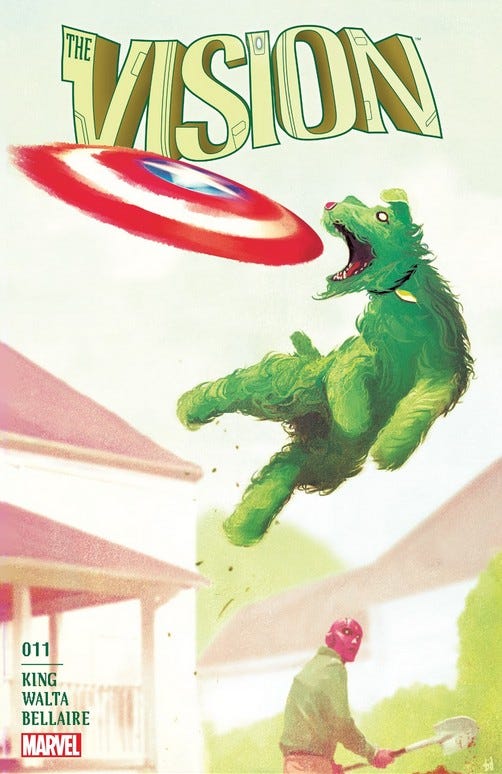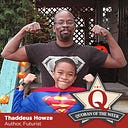Series Review: The Vision (2016)
The Answer-Man’s Quick and Dirty Reviews


The Vision Series written by Tom King, art by Gabriel Hernandez Walta
The Vision wants to be human, and what’s more human than family? He goes to the laboratory where he was created, where Ultron molded him into a weapon, where he first rebelled against his given destiny, where he first imagined that he could be more, that he could be good, that he could be a man, a normal, ordinary man. And he builds them. A wife, Virginia. Two teenage twins, Viv and Vin. They look like him. They have his powers. They share his grandest ambition or perhaps obsession: the unrelenting need to be ordinary. Behold The Visions! They’re the family next door, and they have the power to kill us all. What could possibly go wrong?

The series came to me highly recommended by my friend and fellow writer, Hannibal Tabu, of CBR’s Buy Pile and the Operative Network fame.

I have always loved the Vision as a character. That we are only a year apart in age further endears him to me.
As an autist, I found his analytical approach to the world, quite familiar and oddly comforting. Classifying and quantifying everything, the Vision saw the world anew everyday and took nothing for granted. He could analyze his own thought processes, engaging in metacognition, questioning the value of his existence, much like I found myself doing growing up in a world where few people were familiar with autism or androids.
Born from the menace of Ultron, Vision is the unexpected counterpoint to Henry Pym’s greatest threat to the world, a man-machine seeking to be closer to humanity. Yes, he is Pinocchio, the toy trying to become a real boy, but unlike the toy, he has exhibited agency when writers were clever enough.

I was always interested in his otherness, his outside-the-box view of the Avengers. Few writers ever exploited his character, mostly turning him into the threat of the year ever few years via back-hacks or some other Ultron/AI agenda.
When you consider, as an Avenger he has saved the world at least 37 times (to hear him tell it) you have to wonder what he thinks of the world which still does not see him as a part of it. Plus, in his own estimation, he is still unclear as to his role as a part of the world at large, beyond his ability to save it repeatedly.
Enter Tom King. He has turned the Vision inside out for your edification and amusement. Thank him later.
The Vision is one of the most sophisticated, intelligent and brilliantly written comics this year. Tom King and his team have taken an off-beat book and idea and woven it into a strangely compelling narrative of a man-machine seeking to discover himself and why he seeks to emulate the humanity he resembles but cannot feel.

The Vision’s attempt to create a family of his own, instead of being a farce, has a quiet pathos, an exploration into an emotionless realm filled with a vacuity of unrealized, unrecognized feelings. Id, Ego, Super-Ego only begin to scratch the surface of the Vision’s P-NP dumpster dive into that which is the nature of being Human.
No writer has ever given the Vision the depth, the alien-ness, has quantified his loneliness so well, his sense of duty, of obligation, of internalized suffering, if a machine can be said to suffer, and indeed in Tom King’s capable hands, he does. There is nothing left to chance in this story. It foreshadows, it teases, it haunts, it queries the value of everything. There are so many Easter eggs, so many brushstrokes of Avenger’s history, Vision’s history, things you could only know by exhaustively loving this character.
Did Tom King read every major Vision arc ever told? Did he look at those arcs and wonder what the Vision might have been thinking, or more importantly feeling? Why did he decide to give the Vision a family after Marvel went through so much effort to give him the semblance of humanity, marry him to the Scarlet Witch, give him children only to wrest them away unmaking them in the process? Was it Tom’s goal to give back to the Vision the thing he wanted more than anything else?

You can’t be certain. This is the most telling part of the series. You are never truly certain what the Vision’s motivations are. He gives his family names, but he does not take one. He mixes his wife Virginia’s cognitive matrix (based on Wanda’s) to create his two children Vin and Viv and enrolls them in a suburban school. Why? Sorry, not going to tell you. Tom’s not going to tell you either.

King answers no questions. He simply lets you experience the Visions. King doesn’t just expand the Vision’s family, he expands his awareness of his own filial obligations, how he must juggle work and home, visiting relatives, getting a pet for his kids and the question of how to process love and grief. Subtle elements from the Vision’s past are woven into this story, some from slightly-used fabric others from totally whole cloth, but told in a casual, off-putting way, as if they were of little consequence to the story.

The Vision is a story about families. His own family, created by Ultron, who was the mechanized spawn of Hank Pym, whose brainwaves belonged to Simon Williams, and by proxy he acquires a brother in the Grim Reaper. His marriage to Wanda Maximoff would result in two children who would later cease to exist and yet due to the her unpredictable power of chaos and probability, one day exist again.
The Vision’s family has always been the Avengers, a meta-family capable of protecting or destroying the world. King has made Tolstoy’s quote one of the most frightening things I can think of when I consider what the Vision is capable of: “All happy families are alike; each unhappy family is unhappy in its own way.”


In this series, the Vision is growing decidedly unhappy with how his meta-family perceives his halting steps toward independence… Oh what a real boy he’ll make…Ultron would be so proud. They never stood a chance.
VERDICT: 10 out of 10
This book will win awards. Hell, it should win ALL of them. Its understated prose and artwork, reward you with the opportunity to feel, imagine and sense the lives of Virginia, Viv and Vin struggling to fit in, to find a place and to live up to the expectations of a father who has for all his accomplishments, not been able to find himself. King delivers a tautly told story no extra words, no padding, a story whose economy does not detract from the paucity of text. Each frame is filled with subtext delivered artistically, chromatically, culturally, speaking of a world you didn’t know, you didn’t know existed.

Read it. Feel it. Love it. This book is a feast for all the senses. The Vision is a jewel in this year’s collection of Marvel’s crown of comics. Whatever you do, don’t let this book slip away. Oh the wonderfully bizarre conversations the Visions had. I will miss them so.
I decided to share the series covers because they too were so wonderfully done, each told a story in and of themselves.













The Answer-Man’s Archives are a collection of my articles discussing superheroes and their powers in relationship to their respective universes. We deconstruct characters, memes, profiles and how superheroes relate to real world culture. You can find other Archives on Quora and the Science Fiction and Fantasy Stack Exchange or at The World According to Superheroes.
Thaddeus Howze is a writer, essayist, author and professional storyteller for mysterious beings who exist in non-Euclidean realms beyond our understanding. You can follow him on Twitter or support his writings on Patreon.
